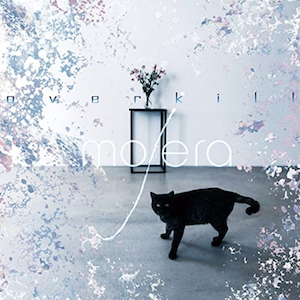overkill
 |
Album Title: overkill |
| Record Label: mojera files & records | |
| Catalog No.: MJRF-001 | |
| Release Date: April 22, 2020 | |
| Purchase: Listen with Apple Music |
Overview
Mitsuto Suzuki’s innovative electronic arrangements have long since left their mark on the JRPG world. Suzuki-san was instrumental in shaping the sound of Square Enix titles like Sigma Harmonics and Final Fantasy XIII, and later landed composer’s credits for The 3rd Birthday and Final Fantasy XIII’s two follow-ups – not to mention a spot on the music team for the recent Final Fantasy VII Remake.
Yet Suzuki-san has been active outside of the gaming space as well. He’s crossed paths with fellow Square Enix veteran Masashi Hamauzu on more than a few occasions, even lending a hand on a few of Imeruat’s albums; and his two previous solo outings, In My Own Backyard and Neurovision, both featured addictive beats, soothing synthesis, and altogether otherworldly electronic composition.
This year alone, Suzuki-san has already lent his talents to two new collaborative projects: ambient works, attributed to yuLa, and overkill, attributed to mojera. Both merit attention, but for now, let’s focus on the latter.
Body
“Hanamogera” kicks off overkill with uplifting spunk. Fizzy, pulsating pads warm up the track, while distorted electric guitar strums, a steady drumbeat, a mellotron flute riff and a confident vocal melody comprise the body. It’s a simple and straightforward electronic-rock hybrid track, with an unchanging two-chord progression and a fairly even-keeled energy level, but the track makes for a compelling intro thanks to its steadfast nature.
From there, overkill shifts moods from track to track, seldom treading the same turf twice. The percussive pops and snips of the titular “Overkill” meld with equally cute and punctual elements to form a dance track with a light and tight character. “Pluto” contrasts the clean sheen of its predecessor with rich distortion and washed-out vocals. “Rain Bringer” takes the tempo down to a more contemplative pace, using fractured and stuttering textures that evoke the image of a rain-laden cityscape.
Most tracks on overkill share vocal performances by non in common. She shines especially bright in “Mojera”, a breezy track with an agile melody and a curious arrangement (acoustic guitar, theremin, and glockenspiel, among other delicate instruments). non takes no part in “Master & Slave”, a roughly six-minute stretch of hypnotic techno; and when she returns in “Prism”, her aching melodies take a backseat to catchy rhythms and sporadic vocal slicing. But in “DJ non Machine Language”, a parodic production masterclass in track form, non (or rather, DJ non) takes center stage, tongue in cheek, as she guides listeners on a strange, comical music-making journey with her synths. Then comes “Camouflage”, and non retires in the DJ bit for a soaring melody worthy of the track’s gritty and glorious distorted sound. “Shinapusu Ryokou” keeps the electronic-rock edge going afterward, but brightens the mood with an optimistic chord progression and starry synth patterns; and non responds in kind, infusing the track with strength and sweetness.
“NiZeroIchiKyu”, the closing track, may be overkill’s best. The reduced tempo, syncopation, and easygoing melody lend the track a laid-back feel, but occasional percussive crashes create tension as they clash with the tune’s softer components. The character of the track is conflicted, wanting for calm but embracing disruptions along the way (not unlike Suzuki-san’s “Nova Chrysalia” from Lightning Returns: Final Fantasy XIII). Moreover, non’s vocals capture the disparity well, coming across relaxed but tinged with a subtle sharp edge.
Summary
In some ways, overkill harkens right back to where Suzuki-san left off with In My Own Backyard and Neurovision, toeing the line between dreamy, distant tracks and danceable ones, and even featuring some of the same trademark synth timbres. Yet thanks to non’s adept vocal performances and a fresh emphasis on rock elements, overkill stands apart from Suzuki-san’s previous works. With any luck, mojera will evolve into an ongoing collaboration. With overkill, mojera is a solid start.
Do you agree with the review and score? Let us know in the comments below!
4
Posted on May 25, 2020 by Reilly Farrell. Last modified on May 25, 2020.














